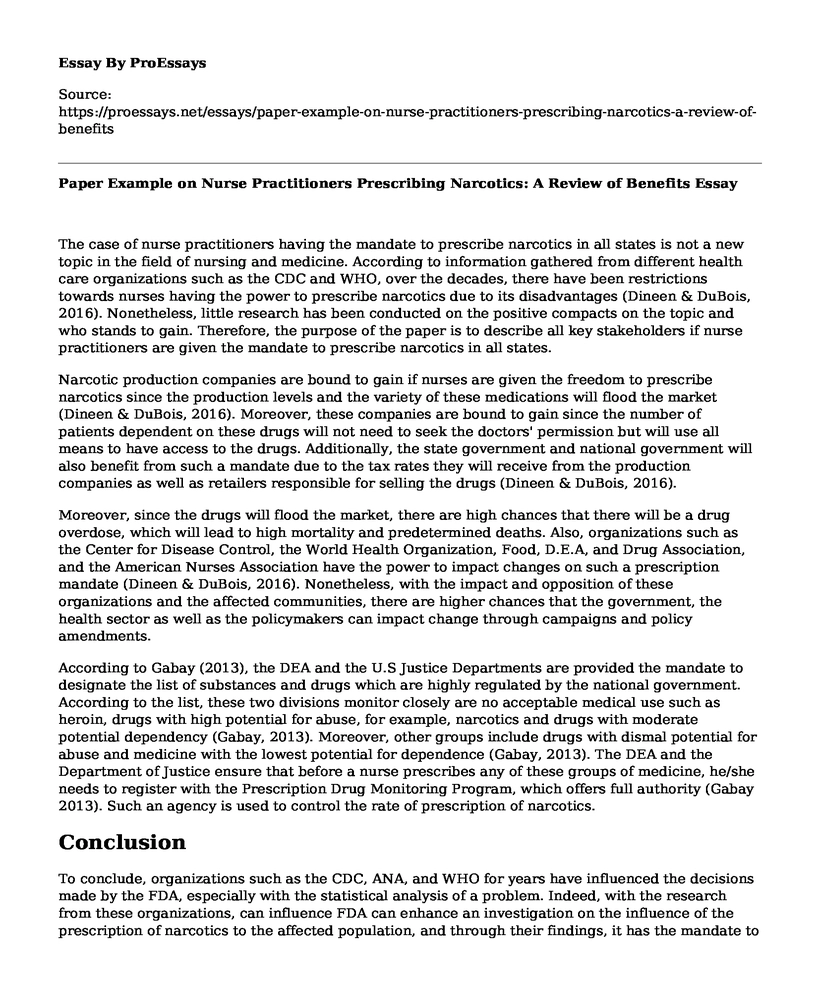The case of nurse practitioners having the mandate to prescribe narcotics in all states is not a new topic in the field of nursing and medicine. According to information gathered from different health care organizations such as the CDC and WHO, over the decades, there have been restrictions towards nurses having the power to prescribe narcotics due to its disadvantages (Dineen & DuBois, 2016). Nonetheless, little research has been conducted on the positive compacts on the topic and who stands to gain. Therefore, the purpose of the paper is to describe all key stakeholders if nurse practitioners are given the mandate to prescribe narcotics in all states.
Narcotic production companies are bound to gain if nurses are given the freedom to prescribe narcotics since the production levels and the variety of these medications will flood the market (Dineen & DuBois, 2016). Moreover, these companies are bound to gain since the number of patients dependent on these drugs will not need to seek the doctors' permission but will use all means to have access to the drugs. Additionally, the state government and national government will also benefit from such a mandate due to the tax rates they will receive from the production companies as well as retailers responsible for selling the drugs (Dineen & DuBois, 2016).
Moreover, since the drugs will flood the market, there are high chances that there will be a drug overdose, which will lead to high mortality and predetermined deaths. Also, organizations such as the Center for Disease Control, the World Health Organization, Food, D.E.A, and Drug Association, and the American Nurses Association have the power to impact changes on such a prescription mandate (Dineen & DuBois, 2016). Nonetheless, with the impact and opposition of these organizations and the affected communities, there are higher chances that the government, the health sector as well as the policymakers can impact change through campaigns and policy amendments.
According to Gabay (2013), the DEA and the U.S Justice Departments are provided the mandate to designate the list of substances and drugs which are highly regulated by the national government. According to the list, these two divisions monitor closely are no acceptable medical use such as heroin, drugs with high potential for abuse, for example, narcotics and drugs with moderate potential dependency (Gabay, 2013). Moreover, other groups include drugs with dismal potential for abuse and medicine with the lowest potential for dependence (Gabay, 2013). The DEA and the Department of Justice ensure that before a nurse prescribes any of these groups of medicine, he/she needs to register with the Prescription Drug Monitoring Program, which offers full authority (Gabay 2013). Such an agency is used to control the rate of prescription of narcotics.
Conclusion
To conclude, organizations such as the CDC, ANA, and WHO for years have influenced the decisions made by the FDA, especially with the statistical analysis of a problem. Indeed, with the research from these organizations, can influence FDA can enhance an investigation on the influence of the prescription of narcotics to the affected population, and through their findings, it has the mandate to sanction policies to stop nurses from prescribing the drug. An excellent example of the power willed by the FDA is the 1995 black box warning and high-alert medications that were directed to practitioners who prescribed drugs that enhanced the risks of patients. Such an initiative can be used in this situation to stop the prescription of narcotics.
References
Dineen, K., & DuBois, J., ( 2016). Between a rock and a hard place: Can physicians prescribe opioids to treat pain adequately while avoiding legal sanction? Am J Law Med., 42(1): 7-52.
Gabay, M., (2013). Federal Controlled Substances Act: Controlled substances prescriptions. Hosp Pharm., 48(8): 644-645.
Cite this page
Paper Example on Nurse Practitioners Prescribing Narcotics: A Review of Benefits. (2023, Jan 23). Retrieved from https://proessays.net/essays/paper-example-on-nurse-practitioners-prescribing-narcotics-a-review-of-benefits
If you are the original author of this essay and no longer wish to have it published on the ProEssays website, please click below to request its removal:
- Literature Review Sample on Parenting Style and Nutritional Strategies Among Migrants in Michigan
- Strategies for Improving Latino Healthcare in America Video Response
- Essay on Osteoporosis in Aging
- Essay Sample on Pursuing a Doctoral Program in Nursing
- Essay Sample on Rural Population and Telehealth
- Essay Sample on Nurses Vital for Software Dev't: Health IT Failure High, Complex Patient Care Needs
- Smoking Habits Among the Youth - Essay Example







